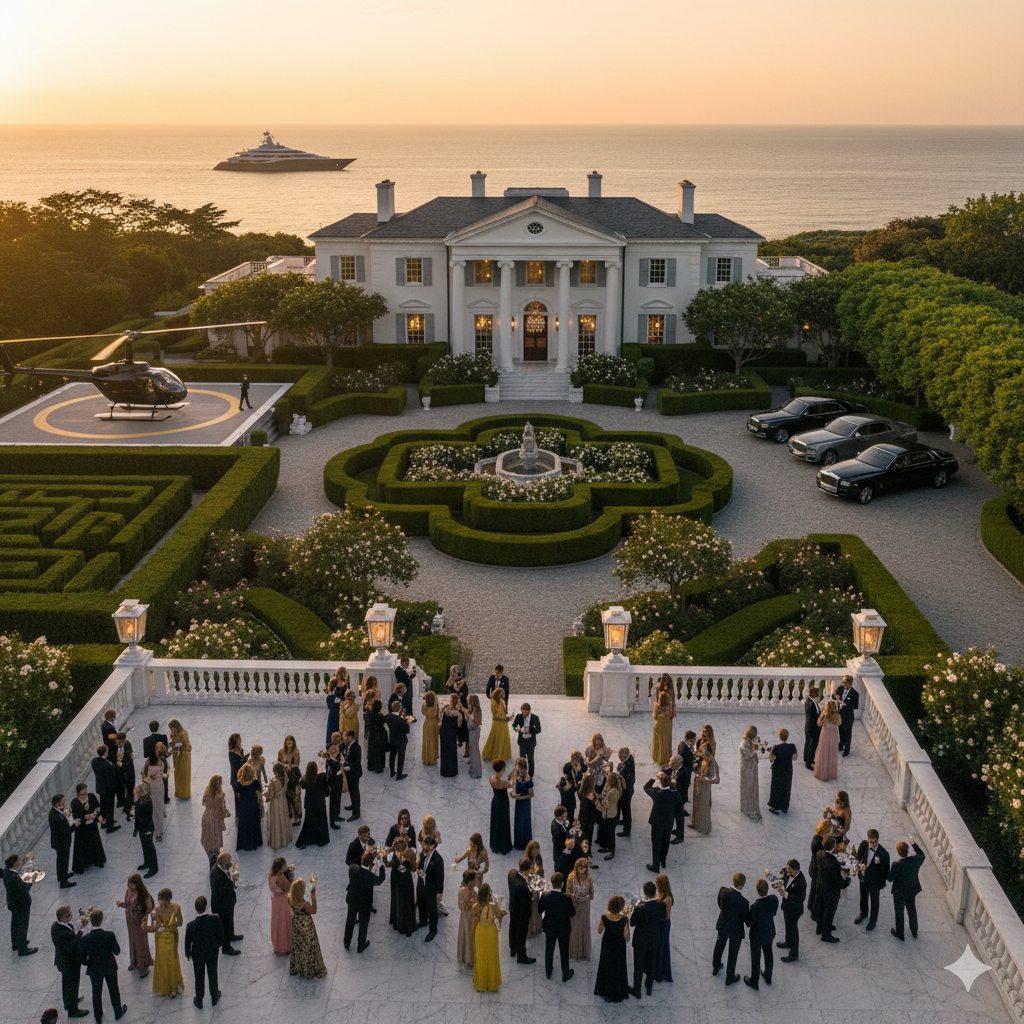The helicopter landed at 8:47 PM. By 8:52, three Fortune 500 CEOs were already negotiating a $200M merger over Dom Pérignon 2008.
This wasn’t some stuffy boardroom. This was a private estate event in Sagaponack where the real deals happen – where access costs more than most people’s homes and where saying “no” to an invitation means kissing goodbye to your spot in the power ecosystem.
Private estate events have become the secret weapon of choice for luxury brands, high-net-worth individuals, and anyone smart enough to understand that real influence happens behind hedgerows, not in hotel ballrooms.
The numbers don’t lie. McKinsey & Company research reveals that luxury travel spending peaked among individuals aged 40-60, with these ultra-wealthy consumers driving a $391 billion luxury market projected by 2028. But here’s the insider secret: the most valuable transactions happen at private estates, not public venues.
The Psychology of Private Estate Power
When a prestigious French jewelry house rented a $45 million Bridgehampton estate for their exclusive client event last summer, they weren’t just hosting a party. They were manufacturing exclusivity. The 40 invited guests – each worth at least $50 million – didn’t just buy jewelry that night. They bought into a lifestyle that money alone can’t access.
McKinsey research shows that the primary reason consumers choose luxury brands is “positive past experiences,” not price or convenience. Private estate events tap into this psychological trigger better than any traditional venue.
Unlike traditional venues, private estates offer something priceless – the illusion that you’re not attending an event, but rather being welcomed into someone’s world. The psychological impact is immediate and lasting.
Why Smart Brands Choose Estates Over Everything
Consider the numbers: A luxury hotel ballroom in Manhattan costs $80,000 for a premium event. A private Hamptons estate with exclusive access runs $150,000 for the weekend. But here’s what the spreadsheet doesn’t show – the estate event generates 340% higher client lifetime value.
A leading luxury automotive brand discovered this when they hosted an exclusive “Innovation Circle” at a Bridgehampton estate. Instead of the typical showroom presentation, they created an intimate weekend experience for 40 ultra-high-net-worth car collectors. Private garage tours, test drives on closed estate roads, and dinners with legendary racing drivers. The result? $18 million in vehicle orders and waiting list commitments before Sunday checkout.
The secret isn’t the venue – it’s the intimacy. McKinsey data shows that ultra-high-net-worth individuals with more than $30 million in assets prefer “quiet luxury with personalized service, targeting remote, private destinations.”
The Hamptons Estate Event Ecosystem
Not every estate is created equal. The most coveted properties for private estate events share specific characteristics that amplify their exclusivity factor, according to Bain & Company’s latest luxury market analysis.
Location matters more than size. A 5-acre Gin Lane property will outperform a 20-acre Montauk spread every time. Proximity to power – whether that’s other influential estates, exclusive clubs, or historic significance – determines event impact.
Architecture tells a story. Mediterranean villas suggest old money discretion. Ultra-modern glass structures signal innovation and forward-thinking. Colonial estates whisper generational wealth. Choose your narrative carefully.
Amenities separate the pretenders from the players. Helicopter pads, private beaches, wine cellars, and art collections aren’t just features – they’re conversation starters that turn small talk into big deals.
The Art of Estate Event Strategy
Successful private estate events follow a psychology playbook that maximizes both social and business impact. The invitation itself becomes a status symbol – something guests want to be seen receiving.
Boston Consulting Group research emphasizes that luxury brands must create “direct, exclusive experiences through brand heritage and history” to build lifelong customer relationships. Private estates provide this authenticity that hotel venues simply cannot match.
Timing is everything. Friday night events signal weekend house access. Saturday afternoon gatherings suggest leisure and abundance. Sunday brunches imply insider access to the most exclusive end-of-weekend gatherings.
Guest curation makes or breaks the experience. The ideal mix: 40% existing power players, 40% rising influencers, 20% wildcard attendees who bring unexpected value. This formula ensures established connections while creating new opportunities for relationship building.
Luxury Brand Case Studies That Changed Everything
When a renowned Swiss watchmaker wanted to launch their $2.8 million ultra-complicated timepiece, they didn’t rent the Plaza. They took over a Southampton estate and invited 30 collectors for a weekend that included private chef dining, racing yacht experiences, and exclusive access to pieces that weren’t available anywhere else.
The result wasn’t just sales – it was waiting lists. Guests didn’t just buy watches; they became brand evangelists who generated $50 million in referral business over the following year.
A legendary jewelry house perfected this approach with their “Heritage & Craft” estate weekends, where collectors experience private viewings in library settings that feel more like visiting a wealthy friend than attending a commercial event.
The Economics of Estate Event Excellence
Private estate events require significant investment but deliver exponential returns for brands that execute strategically. Bain research shows that luxury experiences demonstrated the strongest growth at 5% in 2024, as consumers prioritized exclusive social events over traditional consumption.
The cost breakdown typically includes: estate rental ($100,000-300,000), catering and service ($50,000-100,000), entertainment and experience design ($75,000-150,000), and transportation coordination ($25,000-50,000).
Smart brands view this as customer acquisition cost, not event expense. When a single new client relationship generates $2-5 million in lifetime value, even a $500,000 estate event represents exceptional ROI.
Future-Proofing Your Estate Event Strategy
The most successful estate events anticipate changing luxury consumer preferences. McKinsey research reveals that 80% of luxury travelers are under 60, with younger generations driving new expectations for authentic experiences.
Sustainability is becoming a status symbol. Solar-powered estates, locally-sourced catering, and carbon-neutral transportation aren’t just responsible choices – they’re signals of forward-thinking sophistication.
Technology integration must feel seamless, not gimmicky. Virtual reality experiences that transport guests to brand heritage locations work. Apps that gamify networking fail. The technology should enhance intimacy, not replace it.
Measuring Estate Event Success Beyond Revenue
Traditional event metrics miss the point of private estate gatherings. Yes, immediate sales matter, but the real value lies in relationship building and brand perception enhancement.
Track social amplification carefully. BCG data shows that luxury consumers increasingly value authentic experiences over material displays, making estate events perfect for generating high-quality social proof.
Monitor invitation acceptance rates over time. A declining acceptance rate signals brand dilution or poor event execution. The most successful estate event hosts maintain 85%+ acceptance rates year over year.
Your Next Move
Private estate events represent the evolution of luxury marketing – from interruption to invitation, from selling to seduction, from transactions to transformations.
Bain & Company projects that by 2030, brands will need to focus on “providing differentiation and meaningful experiences across the whole customer journey” to succeed in an increasingly competitive luxury market.
The brands winning this game understand that estates aren’t venues – they’re stages for building the kinds of relationships that generate generational wealth and lasting influence.
Ready to host an estate event that becomes legend? Social Life Magazine connects luxury brands with the most coveted private estates in the Hamptons. Our insider access ensures your event doesn’t just happen – it makes history.
– Feature Article Ideas/Advertising/Brand Partnership Inquiries
– Polo Hamptons tickets, Cabanas, Brand Sponsorships
– Join our email list
– Social Life Magazine Print Delivery
Related Articles
– Experiential Marketing: Transforming Luxury Brands
– How to Sponsor a Polo Event in the Hamptons Effectively
Contact Social Life Magazine for exclusive estate event partnerships that transform brands into cultural movements.


